
However, the loss of liquidity happened at the right time when the VN-Index adjusted to decrease continuously to the bottom of ten months, creating the feeling that investors who lost too much would flee the market.
Flow of money
The latest data for April 2022 from the Securities Depository Center shows that in April alone there were 230,765 new accounts opened by domestic individual investors. If we include institutional investors, then there were 231,275 accounts. In the first four months of this year, the number of new accounts opened by domestic individual investors were around 905,846 accounts.
The number of new investors entering the market remain at a very high level, in stark contrast to the continuously declining liquidity level from the beginning of the year until now. According to Fiingroup statistics for April 2022, the large group of individual investors sold a net of VND 4,300 bn. However, the amount of money in the accounts of investors at securities companies did not increase in proportion to the amount of net sold, and the balance of deposits and accounts of individual investors in the first quarter of 2022 was not significant, and even decreased compared to the fourth quarter of 2021.
It is likely that after the net sale, this amount was withdrawn from the stock market by individual investors, leading to a disproportionate increase in the amount of deposit in the account. The VN-Index dropped sharply from the end of March until now, causing many investors to suffer heavy losses.
It is entirely possible for individual investors to flee from the stock market once they start to make losses. It is common to see on forums and securities groups a volume of exits, selling and cutting losses from losing investors who wish to return to doing honest business in the real world. The disillusionment of the dream of getting rich quickly from stock speculation can be felt everywhere at such a time.
The increased supervision of price manipulation and criminal handling in some cases also caused the speculative groups to reduce their activity intensity and as well as speculation. Bankruptcy stocks in the recent decline also caused a large amount of capital to evaporate and most of the borrowed money was returned to securities companies or banks. However, there were many businesses, even listed companies, who took advantage of the previous production and business capital to speculate on stocks, but have now stopped because of losses, which also caused cash flow in the market to decline. Financial statements for the first quarter of 2022 show that many businesses have completely cut stock investment activities and short-term financial investment activities.
Raising capital
The stock market grew strongly, and people poured money into it, creating a golden opportunity for businesses to raise more and more capital. This is a legitimate operation and for the right purpose for this capital channel, but it also reduces purchasing power in the market. According to a statistics report from the State Securities Commission, in 2021, the scale of capital increase of listed companies with the total number of shares registered for sale reached more than 16,330 billion shares, equivalent to more than VND 177,000 bn, 2.1 times higher than in the same period in 2020. The capital raising activities were through the method of not drawing money directly from ordinary investors, such as by paying dividends, bonus shares and buying rights. Particularly for securities companies in 2021, around 32 units completed the increase of charter capital with total additional capital of VND 32,579 bn.
A Fiingroup statistics report in 2021 showed it was a record year for capital mobilization. Listed companies issued shares to mobilize about VND 100,600 bn. This was only the value of the secondary supply of shares, raising capital directly from the market. It does not include issuances without money into the business such as stock dividends and bonus shares.
Such capital raising causes cash flow to move from investor accounts to listed companies. Therefore, the issuance is also a factor that reduces aggregate demand in the market. This is the most important factor that makes the buying ability of investors increasingly weak according to the speed and size of the issuance. If investors do not buy, they will lose because the scale of additional issuance is larger than the size of new money entering the market. This lesson has been tested in the period 2007 to 2008.
Margin depletion
Another market reason for the decrease in daily liquidity is losing too quickly when using borrowed capital for speculation, which has made more and more investors afraid of using margin. The explosive liquidity in 2021 to early 2022 certainly has a loan element, when warnings about margin depletion were issued daily by securities companies. Even from the second half of 2021, financial experts from Dragon Capital have assessed that the liquidity level of VND 30,000 bn per session is unrealistic and the level of VND 15,000 to 17,000 bn per session is more reasonable. This view implies that the excessive use of borrowed capital has over-inflated the liquidity in the market.
In the last three weeks, the matching value of the two listed exchanges has averaged at only about VND 16,100 bn per session. After days of bitter failures due to rapid losses due to margin use, it seems that the buying power in the market is returning to real numbers. This shows that it is not really a bubble of money flow that is disappearing, but that the market is not used to seeing deflation for a long time.




















